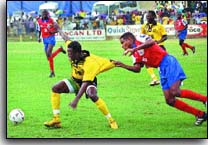 Football, as known in Jamaica is the same as soccer. It is truly known as the world's sport. It attracts the largest amount of spectators around the world.
Football, as known in Jamaica is the same as soccer. It is truly known as the world's sport. It attracts the largest amount of spectators around the world.In Jamaica football began around the 1800's. Like many things in Jamaica it was probably introduced by the Europeans.

Jamaica's first football club is said to have been formed in 1893 and it remained largely a club sport for half a century before evolving into a community-based sport. According to the Jamaica Football Federation (JFF), the Kingston Cricket Club was one of the first to introduce football although many members quickly became jealous of the new game's popularity. The first recorded organised competition took place in 1906 when former governors Sir Sydney Oliver and Sir William Manning donated trophies to be won by schoolboy teams.
The JFF notes that by 1910 the Football Association had been formed and it controlled all of the games, the majority of which were played mainly in the Corporate Area. Jamaica's first international appearance occurred in 1925 when a national team was selected from the Corporate Area teams and they played against Haiti. Jamaica won all three games 1-0, 2-1 and 3-0. The following year Jamaica hosted Haiti at Sabina Park and won 6-0. Between 1925 and 1962, Jamaica played regularly with teams from Haiti, Cuba and Trinidad and Tobago, as well as the Argentinean Tigers and the British Corinthians. Many of the games were played at Sabina Park and many clubs were established, including Melbourne, Kingston, Kensington, Lucas and St. George's Old Boys.
During this period many school clubs were also formed, beginning with the more traditional, elite schools. Rural schools began to compete vigorously for the DaCosta Cup and Corporate Area schools for the Manning Cup. The winner of each cup went on to compete in two matches for the Olivier Shield. The national players were all former schoolboy footballers who had gone on to play in clubs and been recruited to represent Jamaica.
Today the National Premier League (NPL), the island's highest league, counts 10 teams, major corporate sponsors, regular media coverage and hundreds of thousands of spectators. They are increasingly reaping benefits from the sale of players to English and European teams. The NPL is well organised, fed by the parish leagues and their annual play-offs decide promotions to the national level. The NPL in turn then feeds the national team. The national team also benefits from the skills and experience of a number of players who currently play for European teams, including in England: Ricardo Gardener (Captain of the Bolton Wanderers), Ricardo Fuller (Southhampton) and Claude Davis (Sheffield United), and in Sweden, Luton Shelton and Khari Stephenson.
With the women's under-20 team emerging as the #1 team in the Caribbean in 2005 and an increasing number of Jamaican male players being traded into the English Premier League and other European Leagues, it is only a matter of time before the island tastes sustained glory on the international stage.
Sources: http://www.jamaica-gleaner.com/pages/history/

No comments:
Post a Comment